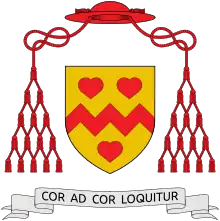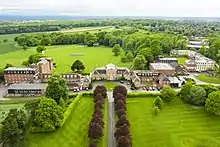| The Oratory School | |
|---|---|
 | |
| Location | |
| , , RG8 0PJ England | |
| Coordinates | 51°31′57″N 1°03′30″W / 51.532562°N 1.058421°W |
| Information | |
| Type | Public School Private day and boarding |
| Motto | Latin: Cor ad cor loquitur (Heart speaks to heart) |
| Religious affiliation(s) | Roman Catholic Oratorian |
| Established | 1859 |
| Founder | Saint John Henry Newman |
| Local authority | Oxfordshire |
| Department for Education URN | 123282 Tables |
| President | The Lord Judge |
| Chairman of the Governors | Pascale Lo |
| Head | Julian Murphy |
| Gender | Boys and Girls |
| Age | 11 to 18 |
| Enrolment | 373 |
| Houses | 5 |
| Colour(s) | Oratory gold & black |
| Publication | The Oratorian The Buzz |
| Former pupils | Old Oratorians |
| Website | https://www.oratory.co.uk/ |
The Oratory School (/ˈɒrətɒri/)[1] is an HMC[2] co-educational private Roman Catholic boarding and day school for pupils aged 11–18 located in Woodcote, 6 miles (9.7 km) north-west of Reading, England. Founded in 1859 by Saint John Henry Newman, The Oratory has historical ties to the Birmingham Oratory and the London Oratory School. Although a separate entity from the nearby Oratory Preparatory School, it shares a common history. Newman founded the school with the intention of providing boys with a Roman Catholic alternative to Eton College.[3] Until 2020, when it first admitted girls, it was the only boys’ Roman Catholic public school left in the United Kingdom. According to the Good Schools Guide (last review: Oct 2021), the school is “an active choice for families looking for a small, nurturing environment."[4]
The Oratory has received the highest grade of 'Excellent' for both Independent Schools Inspectorate (ISI Report: Nov 2021) categories: pupils’ academic & other achievements and pupils’ personal development.[5]
History

The Oratory School was founded in 1859. The first boys arrived before work began on 1 May that year.[6] The objective was to provide a Roman Catholic alternative to other schools, particularly for the sons of converts from Anglicanism who considered existing Catholic schools culturally and socially inferior.[3]
The school was originally located in Edgbaston, Birmingham, attached to the Birmingham Oratory Fathers' House and the Oratory Church. In 1923, under pressure for additional space, it moved to Caversham Park, a Victorian stately home near Reading. Following the outbreak of the Second World War, that property was requisitioned by the government, initially with the intention of being used as a hospital, but in the event being purchased in 1941 by the BBC as a base for its Monitoring Service. The school acquired a new site not far away in Woodcote, where it has remained ever since.[7] According to a Freedom of Information Request the school withdrew from the Teachers Pension Scheme on the 31st December 2020.[8]
The Schola Cantorum
The school's youth choir is the Schola Cantorum; it releases recordings and is known for its Tudor music.[9]

Real Tennis
The Oratory is one of four schools in the United Kingdom with a real tennis court (others being Radley, Canford, and Wellington College), and plays the sport, hosting championships and international tournaments. It was the first location in the United Kingdom to construct a real tennis court for 80 years, finishing the building in 1990.
The UK Professional Singles Tournament has been held at the court, and in April 2006 the World Championships were held there in which world no. 1 Robert Fahey (Australia) beat USA player Tim Chisholm.[10] In January 2020 the World Championship Eliminator match took place between Camden Riviere and Old Oratorian, Nicky Howell.
The school's head of racquets and games coach is Claire Fahey, Women's Real Tennis Champion. Robert Fahey is head professional of the school's Real Tennis Club (ORTC).
Notable head masters
The head master, Julian Murphy, is a member of the Headmasters' and Headmistresses' Conference.
- 1862–1865 Tom Arnold
- 1910–1921 Edward Pereira
- 1933–1939 Illtyd Trethowan
- 1953–1967 Adrian Morey
- 2000–2014 Clive Dytor[11]
Controversy
Sexual abuse
In February 2013, it was discovered that Jonathan O'Brien, a former teacher, had been involved in sexually abusing boys aged ten to sixteen while working at The Oratory in the 1980s. O'Brien was sentenced to thirteen years imprisonment.[12]
Disciplinary
In February 2014, there were allegations that older pupils had been beating younger students and killing animals outside school - including the skinning of a cat. A teacher resigned and alleged that she had done so because her concerns over the pupils' behaviour had been repeatedly ignored.[13][14] She then filed a claim against the school for "forced dismissal" but the claim was thrown out by the Reading employment tribunal as she had voluntarily resigned and was not "forced to quit". The then-headmaster Clive Dytor stated that the incidents she mentioned had already been dealt with.[15]
Notable alumni
- Gervase Elwes (1866–1821) – tenor
- Hilaire Belloc (1870–1953) – orator, poet, sailor, satirist, writer of letters, soldier, and political activist
- John Pius Boland (1870–1958) – Irish Nationalist politician, Member of Parliament (MP), gold medallist Olympic games for tennis (1896)
- Sir Adrian Carton de Wiart (1880–1963) – soldier and diplomat
- Simon Elwes (1902–1976) – war artist
- Christopher Tolkien (1924–2020) – academic editor
- Igor Judge (1941-2023) – judge who served as Lord Chief Justice of England and Wales
- Michael Tolkien (b. 1943) – teacher and poet
- Michael Berkeley (b. 1948) – Baron Berkeley of Knighton, composer, broadcaster
- Ayoola Erinle (b. 1980) – rugby union player
- Danny Cipriani (b. 1987) – rugby union player
- Benny Howell (b. 1988) – cricketer
- Jonathan Bailey (b. 1988) – actor
- Afonso, Prince of Beira (b. 1996) – Portuguese royal
Notable staff
- Gerard Manley Hopkins, poet, taught at the school in 1867-68.[16]
See also
References
- ↑ Wells, John C. (2008). Longman Pronunciation Dictionary (3rd ed.). Longman. ISBN 978-1405881180.
- ↑ "HMC Independent Schools | Headmasters' & Headmistresses' Conference". HMC. Retrieved 19 January 2022.
- 1 2 Shrimpton, Paul (2005). A Catholic Eton? Newman's Oratory School. Leominster: Gracewing Publishing. pp. 26, 29, 41–43. ISBN 9780852446614.
- ↑ "The Oratory School, Nr Reading". The Good Schools Guide. Retrieved 19 January 2022.
- ↑ "Independent Schools Inspectorate report 2021". isi.net. Archived from the original on 2 February 2022.
- ↑ Newman's Letters and Diaries, Volume XIX, p.120.
- ↑ "History of The Oratory School". The Oratory. Retrieved 10 November 2020.
- ↑ https://www.whatdotheyknow.com/request/763181/response/1830358/attach/3/FOI%20Response%20Smail.pdf?cookie_passthrough=1
- ↑ Breen, Edward. "Sacred Treasures of England". Gramophone. Retrieved 21 July 2023.
- ↑ "Website of the International Real Tennis Professionals Association". irtpa.com. Archived from the original on 22 June 2008. Retrieved 27 April 2018.
- ↑ Head decides to quit after walking old pilgrims’ trail dated 3 November 2014 at henleystandard.co.uk, accessed 3 May 2019
- ↑ Thorne, Lucy (16 January 2015). "Jonathan O'Brien appeal: Former The Oratory School teacher loses bid to cut sentence". Archived from the original on 22 August 2016.
- ↑ Millward, David (6 February 2014). "Industrial tribunal told of 'appalling behaviour' of pupils at Oratory School". Archived from the original on 22 August 2016.
- ↑ "Public schoolboys 'stoned birds and skinned cats'". The Times. 5 February 2014.
- ↑ "Housemother loses claim for constructive dismissal against Oratory School". Berkshire Live (getreading). 12 May 2014.
- ↑ Feeney, J.J. (2016). The Playfulness of Gerard Manley Hopkins. Nineteenth Century. Taylor & Francis. p. 12. ISBN 978-1-317-02119-3. Retrieved 28 November 2023.
Further reading
- Tinkel, Tony (2009). Cardinal Newman's School: 150 years of The Oratory School, Reading. London: Third Millennium Publishing. ISBN 9781906507091.
External links
- The Oratory School website
- Profile on the Independent Schools Council website
